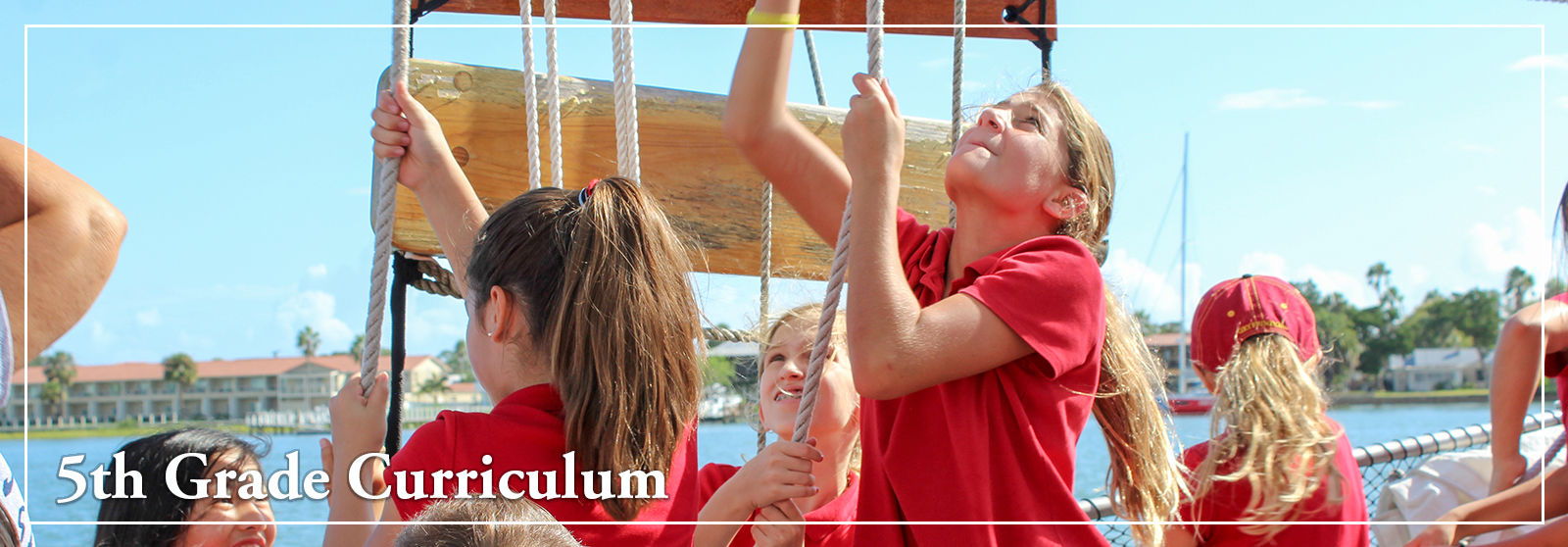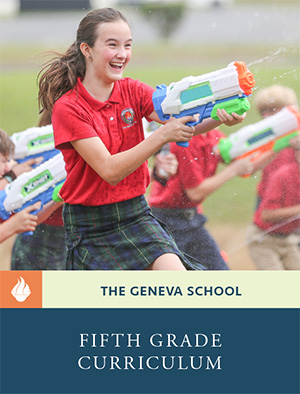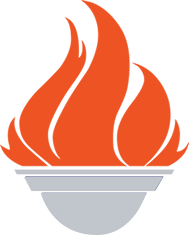5th Grade Curriculum
Fifth grade is a year of growing independence. Students begin to enter the stage of childhood where non-concrete thinking develops, and they begin to see a “whole new world” in their ability to conceptualize and process through complex thoughts and stories. This is the backdrop for students to study American history: the country moves from dependence on a king to independence with a new government.
This is also the year when students begin practicing self-governance with their studies, their relationships, and their spirituality. Teachers continue to direct students to pursue a deep love of learning and solidify their scriptural foundations. Journeying through fifth grade is an exciting adventure.
History
(1415–1820)
Fifth grade history covers the story of Native Americans before explorers arrived in the New World to the stories that tell of our country’s growth and change through the 1870s. Students are taken from the tumultuous times of medieval Europe with its barbaric Vikings, chivalrous knights, and bold reformers into the Age of Exploration. Students learn about the discovery of the New World and quickly find that despite the growth in the past, men wanted more—more power, more land, more gold, and ultimately more liberty. From the shores of the Old World, they begin to look to the new. Students are captivated by the stories of the early explorers like Columbus, the Spanish explorations, and the permanent European settlements and colonization. They move through these into the American Revolution and the building of a new nation. From the exploration west of the Mississippi, to the first decades of the 1800s and Jacksonian Era, students see our country grow and expand. Their studies continue into the turbulent 1850s and the division and eventual healing of the nation after the Civil War. Through the stories of great men and women, the students come to appreciate the sacrifices and dedication of those who built our great nation.
Language Arts
Spelling, Grammar, and Penmanship
Spelling instruction is phonics based and follows the Orton-Gillingham approach. Phonemes and spelling rules are taught explicitly in a structured and sequential manner. Fifth graders manipulate a variety of Greek and Latin roots and affixes to build their vocabulary while continuing to utilize the spelling concepts they have learned in earlier years. All these skills aid the students in their growth as fluent readers. Further, the students memorize rules of grammar using the Shurley Grammar curriculum. They then apply what they have learned, delighting in the cleverly crafted writing of our literature selections. Fifth grade students begin the year by proudly displaying their cursive penmanship on all written assignments, and they are encouraged to fine tune their letter formation throughout the year, adding excellence to their written assignments.
Literature and Composition
Fifth grade composition instruction is theme based, following the structure set forth by the Institute for Excellence in Writing. Over the course of the year, students’ writing increases in complexity as they compose in a variety of formats on such topics as the Boston Tea Party, the Louisiana Purchase, and Davy Crockett.
To create excitement and to nurture a love of learning through books, teachers and students dive into books such as The Witch of Blackbird Pond, Johnny Tremain, Amos Fortune, Carry On, Mr. Bowditch, and Across Five Aprils. These classic stories integrate what the students are learning in their history studies. The main method students utilize to assimilate the text that they read is the classical practice of oral narration. Students also transfer their oral narrations to written narrations on a regular basis. This practice is foundational in strengthening the students’ abilities in reading comprehension, writing, and rhetoric. Students also gather for special read-aloud times throughout the week. Teachers delight in building wonder and enlarging the moral imaginations of their students through the expressive reading of Tales from Shakespeare, The Horse and His Boy, and The Bronze Bow. In addition, weekly literature circles give students the opportunity to engage in meaningful small-group conversations about novels such as Blood on the River, The Silver Chair, Fever 1793, and Island of the Blue Dolphins.
Library Science
Students in fifth grade learn how to set up their own library accounts and how to independently use the automated catalog. They use the library to find resources for classroom research projects. Students are exposed to the different genres of literature, and they hear reviews of specific titles from each genre. They are encouraged to share their opinions about books during our class discussions and share book recommendations with their classmates. Library skills are reviewed and reinforced
Mathematics
Curriculum: think!Mathematics
In fifth grade, students strive toward mastery of foundational math topics for real-world application in preparation for algebra in the dialectic years. The curriculum builds on an early understanding of composition and decomposition of numbers along with mastery of basic facts and computation algorithms. Emphasis is placed on problem-solving, skill consolidation, and a deep understanding of fractions, decimals, ratios, model drawing, expressions, equations, and inequalities. Challenging problem-solving is integrated into each chapter to reinforce the application of concepts and skills learned. Mathematics is taught as a language with an emphasis on vocabulary and regular math journaling. Hands-on learning activities are integrated throughout the lessons so that students may practice important concepts and vocabulary. The ultimate goals of the mathematics curriculum are for students to experience success and develop a lifelong love of math.
Bible
Within the Bible curriculum, fifth grade students walk through the life of Christ in the four Gospels. The Apostle John’s proclamation, “In the beginning was the Word, and the Word was with God and the Word was God” (John 1:1), sets the stage for students to understand the precept of studying God’s word. Students eagerly memorize several Scripture passages, and they use dramatic reenactment to more deeply experience Scripture. In fifth grade, students explore the themes of conflict and liberation and learn about multiple conflicts of Christ’s ministry including the rejection of the Jewish leaders, the ideals of what kind of messiah was expected, and even death itself. Students come to see that Christ liberates his people by his death and resurrection. A study of Dangerous Journey further illustrates these concepts and deepens their understanding of their walk as Christians. Teachers desire for students to know that true liberty is found in Christ alone, and students explore the spiritual concepts of Christ freeing them from the bondage of sin and death, the good news of Christ’s salvation, and living in obedience to Christ and his Word. The ultimate goal of fifth grade biblical teaching is for students to develop a love for their Savior and the Bible.
Science
The room is dark. The teacher, dressed as a sailor of the 1700s, invites students into the classroom with a blow of her ship’s brass whistle. Once inside, a true tale is told of the HMS Association naval disaster and the greatest technological problem of the sixteenth century—how to accurately find one’s longitude. In this manner, fifth grade students launch into a study of navigation, learning about latitude, longitude, compasses, sextants, and triangulation. Fifth grade students learn about the European explorers’ travels to the New World. Thus, history becomes a springboard for the fifth grade science “exploration” of the ocean currents, seafloor features, and physical life zones of Earth’s giant oceans. Using a variety of engaging activities, students investigate Earth’s atmosphere and weather and use microscopes to study microscopic organisms. They end the year with a series of electricity labs.
Foreign Language
Fifth grade students continue their study of Latin by building on the solid foundation of basic noun and verb forms they learned in fourth grade. Though time is mainly spent on learning new tenses of verbs (the imperfect, future, and perfect), students also learn how first and second declension adjectives modify nouns. Students also continue building up a base of key vocabulary words, and they put their grammar knowledge into practice by translating sentences and short stories. Using flash cards and chants, students gain a confident grasp of the language through practice and repetition. Finally, students learn the Vulgate versions of some of their Bible memory passages to experience the historical nature of the Christian faith through their language studies.
Music
In every lower school grade at The Geneva School, music study and performance are vital to developing an aesthetically rich liberal arts education. Fifth grade students experience the music of famous classical composers as well as instruments and stylistic elements from 1500 to 1800 that encompass the Renaissance and the baroque and classical periods. They study the Protestant Reformation in Europe and the colonial period in America. Cross-curricular units include studying the purpose of the instruments used during the Revolutionary War, the history of the harpsichord, and, of course, Charles Wesley, one of the most prolific hymn writers in the 1700s. Fifth grade students perform American folk songs, dances, hymns, and spirituals, all of which further develop their understanding of the role that music plays in our school, history, and the Bible.
All fifth grade students continue to play the soprano recorder. The recorder was one of the primary instruments played during the Renaissance and baroque periods. Through group and self-paced lessons, students use their music reading skills to practice correct fingering, good breath control, and proper tone quality and to learn to play together as an ensemble.
Students engage in activities to create and sing as well as to play the soprano recorder, unpitched percussion, and Orff instrumentation. Students use their developing musicianship skills to read, play, and notate rhythmic and melodic patterns following the Kodaly and Orff methodology.
Performances include Lessons and Carols, the spring concert, and fifth grade’s Brave and Free performance.
Art
In the fifth grade, students develop their drawing and painting skills by working on projects such as still-life arrangements and portraits, which were prominent during the Age of Exploration and the Age of Enlightenment. Students explore the art and lives of well-known artists during these periods as a way of developing their fine motor skills through observation of drawing and painting. They study various ways of creatively composing an art piece. Students are encouraged to use a variety of media (watercolor, acrylic paint, and colored pencils) as they explore their own strengths and weaknesses while continuing to grow in their understanding of how to successfully use the elements of design and continue to build on artistic concepts and techniques. Each project is thoughtfully designed to coordinate with the units of study. For example, students create a technical compass rose as they continue their Age of Exploration studies, draw Venetian-style self-portraits, and work on a collaborative Dutch still-life collage during their history studies.
Drama
The drama program not only seeks to enrich each student’s study of history and literature through experience but also seeks to build character through the rehearsal and production process. Students take on responsibilities appropriate to their developmental level and must problem-solve and work together as a group to tell their story.
In fifth grade, the students perform Brave and Free, a fast-paced, tongue-in-cheek review of what they have learned in American history throughout the year. This entertaining, patriotic show includes a recitation of the Declaration of Independence, as well as the singing of “The Preamble” and “The Star-Spangled Banner.” The students are expected to take on more responsibilities than in previous productions, including managing numerous props and quick entrances and exits. They are also required to master more complicated choreography. This show is performed in Riley Arena, and students complete the year feeling more confident in their ability to fill up a large space with strong voices and bold physicality.
Physical Education
The Geneva School is committed to providing a physical education curriculum that allows frequent and diverse opportunities to engage in physical activities that support a healthy mind and body. Fifth grade students learn how incorporating personal fitness into their daily lives improves their health and glorifies God. They explore and analyze how to make small changes to their daily routines to increase levels of fitness and improve health. Students engage in fitness activities that incorporate the five components of health and the six components of skill fitness. In fifth grade, students engage more in team play, becoming more familiar with the components of teamwork and developing interpersonal skills. Students learn and practice these key skills in duos and in small- and large-group settings. They make connections between interacting with others and being Christ’s image bearers as they learn the importance of character and its direct impact on teamwork. Students put these skills into practice through various cooperative challenges, trust activities, and dance. With the academic emphasis on United States history, students learn ballroom dances as part of their celebration of George Washington’s birthday, further developing their interpersonal skills. Students learn more complex motor skills associated with specific sports skills through practice drills and modified game play and encounter basic offensive and defensive strategies in individual, dual, and team sports. Fifth graders continue to develop motor proficiency through expressive play and creative movements such as rhythm activities.
Field Trips and Culminating Events
Field Trips
- St. Augustine
- Barberville Pioneer Settlement
- Environmental Learning Center
- Rollins Museum of Art
- 3-Day Science Trip to the Florida Gulf Coast
- Emil Buehler Perpetual Trust Planetarium
- Lewis & Clark (Harry P. Leu Gardens)
Culminating Events
- Colonial Day: After studying the early life of colonists and the hardships endured as they came to the New World, students research a colony and give an informative speech about one of the original thirteen colonies, dress in colonial attire, and spend the afternoon eating a meal of thanksgiving for a safe arrival, reliving the chores of a colonist, and playing the games of colonial children.
- Revolutionary War Reenactment: After being drafted into the British Army, French Army, or Continental Army, the students spend the afternoon learning to drill under the instruction of Major Baron von Steuben. They then march to camp and load their (water) guns and reenact the major battles of the Revolutionary War. Lexington and Concord, Bunker Hill, the Crossing of the Delaware, and many more battles are indelibly stamped in their memories.
- George Washington’s Birthday Ball: After receiving an invitation from Martha Washington to attend General George Washington’s birthday ball, students prepare for this exciting event by researching a Founding Father and learning how to dance the Virginia Reel. They dress in gentry colonial attire to attend the ball, deliver a speech, and attend a concert. Finally, they enjoy a grand feast to celebrate George Washington—with Washington in attendance!
- Brave and Free: The end-of-the-year play is a grand adventure that reenacts all the history the students have learned during the year. In a fun and “independent” way, the students lead the audience through the time of the explorers, the colonies, the Revolutionary War, and the making of our government. There are moments of laughter as the students try to figure out how to run a show without any teachers or any fireworks, and there are moments of awe as they step onto the stage and recite the Declaration of Independence. It is truly a marvelous ending to a year steeped in American history.



